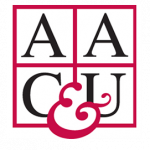 Schoolcraft College was one of just 61 institutions – and one of just two from Michigan – selected by the Association of American Colleges and Universities (AAC&U) to participate in its 2021 Institute on High-Impact Practices and Student Success. (The University of Michigan was the other participant from the state.)
Schoolcraft College was one of just 61 institutions – and one of just two from Michigan – selected by the Association of American Colleges and Universities (AAC&U) to participate in its 2021 Institute on High-Impact Practices and Student Success. (The University of Michigan was the other participant from the state.)
The Institute is designed to advance campus- and system-level efforts to achieve quality, equity and student engagement goals through the design, implementation and assessment of active teaching and learning practices widely known as “high-impact practices,” or HIPs.
The Institute was held virtually June 15-18. The team from Schoolcraft College was:
- Adam Authier, Director of Academic Innovation
- Deborah Burke, Professor, Psychology
- Sharon Christian, Director, Learning Support Services
- Helen Ditouras, Professor, English
- Dr. Elaine Lloyd, Professor, Nursing
“The AAC&U Institute on High-Impact Practices and Student Success provides an unparalleled opportunity for colleges and universities from across the country to collaborate on ways to become more intentional in serving all students and to improve both completion rates and the quality of student learning,” said AAC&U President Lynn Pasquerella.
Each team worked with leading experts and practitioners to identify opportunities for deepening connections between students’ assets and their educational experiences. Drawing on research that demonstrates a positive relationship between student participation in HIPs and improved student outcomes, the teams defined and started to develop curricular and cocurricular practices that support student engagement, advance curricular coherence, and generate equitable outcomes.
They also defined and strengthened processes for directly assessing student achievement of the learning outcomes that result from participation in HIPs. These assessment processes will help institutions set and monitor progress toward equity goals to improve educational outcomes for all students.
“The Institute represents AAC&U’s continued partnership with leading experts on high-impact practices and student success to examine the latest research and to address the most pressing issues related to equity, quality, and assessment to design sustainable efforts that are responsive to students’ needs and values the diversity of students’ identities,” said Tia McNair, Vice President for Diversity, Equity, and Student Success and Executive Director for the Truth, Racial Healing & Transformation (TRHT) Campus Centers.
The Institute focused on implementing educational change and bringing effective practices to scale in a time of unprecedented changes, limited resources, and variations in modes of delivery. The curriculum supported campus teams as they develop faculty-engaged, evidence-based, sustainable models and strategies to advance quality, equity, and engagement in service to academic excellence and social justice.
Topics addressed included integrating HIPs across modalities, aligning courses and programs with guided pathways, promoting connections between educational experiences and long-term career success, and encouraging an academically open environment while promoting the safe and civil exchange of ideas.
Professor Burke, Professor Ditouras and Dr. Lloyd graciously provided the following insights at the end of the Institute:
Q: What are your overall impressions of the program?
The AAC&U conference was empowering and enlightening as we learned from and collaborated with experts in the field and our colleagues at the college. If we want to future-proof the College, we all need to pay attention to expanding access to all facets of the higher education experience.
High Impact Practices (HIPs) include educational activities that engage students in active learning that elevate their performance on desired outcomes.
Moreover, the conference focused on the essential role of HIPs in Diversity, Equity, Inclusion and Belonging, all of which are of high value to everyone working in education. HIPs are the best practice in ensuring the work of expanding access and accountability with concrete action plans.
Q: What was the format of the program?
As participants we engaged in keynote presentations, daily breakout sessions, and team consultations that centered on Diversity, Equity, Inclusion and Belonging filtered through the framework of High Impact Practices.
Q: Are there any ideas in particular you want to bring to Schoolcraft College and why?
It is essential that the college re-configure the process of enrollment and advising, retention, co-curricular opportunities, governance, and teaching methodology to expand access through the framework of High Impact Practices.
Q: “Guided Pathways” seemed to be one of the key topics for this program, and it’s a topic that’s growing in importance here at Schoolcraft. In your opinion, were there any ideas from the program that can help us?
Guided Pathways, a portal to facilitate student completion with structures of support for first generation students, is a potential High Impact Practice that the College should continue to develop. HIPs should be embedded in all programing and practices at the college. Below is a list of AAC&U’s High Impact Educational Practices. High-Impact Educational Practices | Association of American Colleges & Universities (aacu.org)
Q: Is there anything else you’d like to add?
Under the leadership of Adam Authier, Director of Academic Innovation, Schoolcraft College’s AAC&U team is comprised of a cross-section of our campus community. We are proud of the work our Schoolcraft team was able to accomplish, but we are not enough. It will take the involvement of the entire campus community to future-proof the College utilizing the framework of High Impact Practices in everything we do.